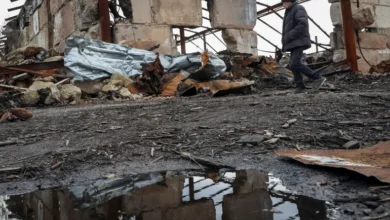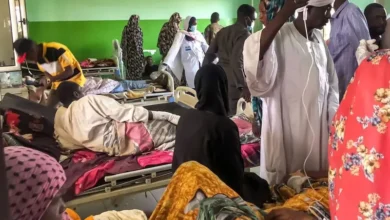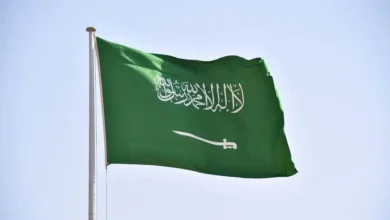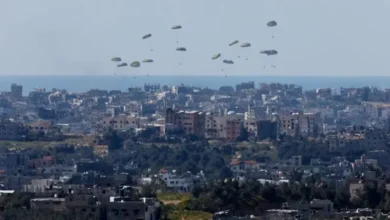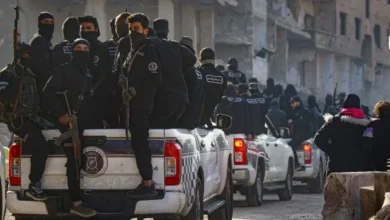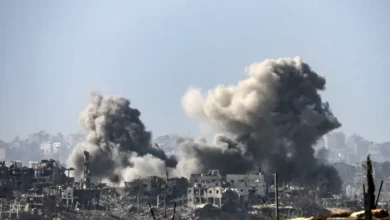The US sits quietly as fate of Syria’s al-Assad hangs in the balance

The US has been relatively quiet about the developments in Syria after armed opposition factions were able to take control of key cities from the government and its forces.
Part of the reason is that the offensive is being led a group the US has designated a terrorist organization, “Hayat Tahrir al-Sham” (HTS).
According to analysts and current and former US officials, the other reason is that the Biden administration does not have an actual policy regarding Syria. For several years now, the administration has said its presence in Syria is to focus on the enduring defeat of ISIS.
A brief statement was put out from the White House on Saturday night to say that the US was not involved in the offensive but blamed Syrian President Bashar al-Assad for the situation that had evolved.
On Sunday, the Biden administration, France, Germany and the United Kingdom put out a joint statement calling for “de-escalation by all parties,” protecting civilians and delivering humanitarian assistance. They urged a political solution in line with the UN Security Council resolutions.
Crushing economic sanctions have been placed on the Syrian president and those who support him. At the same time, Washington has repeatedly warned countries from normalizing ties with the al-Assad government, which could also draw sanctions on those reaching out to Damascus.
Many of the sanctions fall under the Caesar Act, which is set to expire later this month unless lawmakers on Capitol Hill decide otherwise.
Asked if the Biden administration supported an extension of the Caesar Act, a State Department official said this was up to Congress.
“The United States will continue to take all actions available to promote accountability for those who enable the Assad regime’s continued repression of the Syrian people,” the official told Al Arabiya English.
“US sanctions, including mandatory sanctions under the Caesar Act, remain fully in effect,” the official added.
While US officials assessed it was unlikely for al-Assad to fall early in the week, that changed as of Thursday morning. Officials familiar with US intelligence and assessments said the demise of the Syrian president was “no longer impossible.” Though officials and analysts expressed caution that this was a certain outcome, they pointed to the situation of Russia and Iran and its proxies.
Russia has been at war with Ukraine since Moscow invaded over two years ago, while Iran and Israel conducted direct attacks against one another for the first time in history.
Meanwhile, Hezbollah, Iran’s top proxy and arguably the most powerful non-state actor in the world, was dealt a devastating blow in its war with Israel.
Russia, Iran and Hezbollah quickly deployed fighters, advisors and soldiers to Syria to prop up al-Assad years ago. It is unclear if they have the same will, capabilities and capacity to do the same this time around.
US interests in Syria
As for the US, it has always said its interests lie in countering terrorism and Iran’s destabilizing activities in the region and supporting the defense of Israel.

“All of these interests come together in Syria, which is now a mass exporter of insecurity via the nexus of the Assad regime, its Russian and Iranian backers, and the illicit Captagon trade,” said Dana Stroul, the Pentagon’s top official for the Middle East until last January.
Stroul, however, warned that it was not in the US interest for HTS to control Aleppo and that the focus on northwestern Syria presents a risk of emboldening ISIS.
“It’s also not in the US interest to welcome Assad back into the international community unless his regime meaningfully changes its behavior, which is the core driver of the war in Syria,” she said.
Earlier in the week, the Pentagon reiterated that its mission in Syria remained unchanged and was focused on defeating ISIS.
Washington’s close relationship with the Syrian Democratic Forces, particularly in northeast Syria, continues to be robust, according to officials. However, the risk of clashes between SDF fighters and rival groups, including Iran-backed militias, government forces or ISIS, does pose a risk to US troops in the area.
Just this week, the US military said it carried out self-defense strikes that destroyed several weapons systems in the vicinity MSS Euphrates in Syria after rockets were fired at US forces. The Pentagon is still assessing who was operating these weapons but noted that Iran-backed militias in the area conducted attacks on MSS Euphrates in the past. “There are also Syrian military forces that operate in the area,” Pentagon Press Secretary Maj. Gen. Pat Ryder told reporters on Tuesday.
On Thursday, the Department of Defense released more information to say that at least three US troops were being evaluated for traumatic brain injuries (TBI) suffered during the attacks on Tuesday.
The Pentagon referred Al Arabiya English’s questions about potential US-SDF cooperation to take over areas controlled by the Syrian government or Iranian militias to the SDF. The Pentagon would also not provide a direct response when asked if the SDF asked for assistance or provided advanced notice to the US about their operations this week.
While repeatedly saying the US strikes were unrelated to the ongoing clashes between opposition fighters and the government of Syria elsewhere in the country, Al-Monitor reported that the Deir Ezzor Military Council coordinated with the US military as it launched an operation to push out pro-government forces. Citing unnamed sources, Al-Monitor also said the SDF was provided assistance by the US military during its operations.
The SDF published a statement from the Deir Ezzor Military Council saying these operations were carried out to prevent ISIS from taking advantage of the clashes in the northwest of the country.
“The region has an interest in ensuring that violent extremist groups like ISIS, Al-Qaeda, and HTS do not control territory, resources, or civilians. Though there are clearly differing views across the region on how to best prevent terrorist threats from proliferating out of Syria, there is broad agreement that countering terrorism remains critical,” Stroul said.
Al Arabiya English has also learned that at least two dozen Syrian-Americans are looking to evacuate areas of Syria, including Aleppo. “The US government is unable to directly provide any routine or emergency consular services to US citizens in Syria and advises any US citizen seeking consular assistance to contact the US Interests Section of the Embassy of Czechia in Damascus at [email protected],” a State Department official said when asked for comment.
